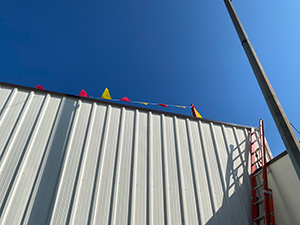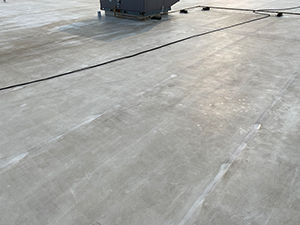
For commercial building owners in Campbellsville, KY, the roof is often one of the most significant investments tied to the property. Yet it’s also one of the most overlooked – until something goes wrong. Water intrusion, structural damage, or unexpected system failures can lead to costly repairs and serious disruptions to your business. That’s where routine commercial roof inspection services come in; not as a formality, but as a key strategy for preventing damage and supporting proactive maintenance. When performed properly, an inspection report isn’t just a checklist; it’s a strategic roadmap to protect your investment and extend the life of your roof.
To take the guesswork out of commercial roof care, contact Commercial Roofing Pros at 857-663-7767 for expert inspections and reliable, data-driven solutions.
Roof Inspection Reports
A commercial roof inspection is much more than a visual walkthrough. It involves a comprehensive evaluation of your entire roofing system – membranes, flashing, drainage, insulation, seams, and even rooftop equipment. But the real value lies in the inspection report.
What’s in a Quality Report?
- Photographic documentation of defects and problem areas
- Detailed notes on wear patterns, moisture issues, or structural concerns
- Recommendations prioritized by severity and urgency
- Timeline-based action items to guide short- and long-term maintenance
A good roof inspection report helps commercial building owners go from reactive repairs to predictive maintenance, potentially saving tens of thousands of dollars over time.
Turning Inspection Data into Maintenance Strategy

Once the inspection is complete, the question becomes: What do we do with the findings? Turning raw inspection data into a smart, actionable plan is the key difference between reactive spending and proactive asset management.
Step 1: Prioritize Critical Repairs
Inspection reports often rank issues as immediate, medium-term, or low-priority. For example:
- Immediate: Open seams, punctures, or active leaks
- Medium-term: Membrane shrinkage, loose flashing
- Low-priority: Debris accumulation or minor UV degradation
By addressing the urgent issues quickly, you stop small problems from becoming catastrophic, and you can budget smarter for future repairs.
Step 2: Schedule Preventive Maintenance
Inspection data can also help plan routine maintenance tasks that prolong roof performance. This might include:
- Cleaning drains and gutters
- Resealing minor cracks
- Applying protective coatings in high-UV zones
- Tightening mechanical fasteners
A well-maintained roof performs better and is more likely to qualify for extended warranties from manufacturers.
Step 3: Align with Your Budget and Calendar
If you manage multiple facilities or a complex commercial property in Campbellsville, KY, inspection data allows you to coordinate repairs with your fiscal cycle, schedule downtime in advance, and avoid emergency disruptions.
How Often Should You Schedule a Commercial Roof Inspection?
The standard recommendation is twice a year, typically in the spring and fall. But you should also schedule inspections:
- After major weather events (hail, wind, heavy snow)
- When buying or selling a commercial building
- Prior to warranty expiration
- When planning HVAC or rooftop equipment upgrades
Routine inspections can catch hidden issues like trapped moisture, deteriorating seams, or insulation compromise, long before they affect building operations.
Weather Considerations
Commercial buildings face specific challenges tied to regional weather. From intense summer heat and UV exposure to heavy snow loads and freeze-thaw cycles, your roof endures year-round stress. These environmental factors accelerate wear on roofing membranes and materials.
That’s why a data-driven inspection process is critical. It lets you track wear trends unique to your building and tailor maintenance plans to local climate stressors.
Choosing the Right Partner
While some contractors offer a quick visual check, Commercial Roofing Pros deliver thorough, standards-based inspections designed to help commercial owners make strategic decisions. The real benefit isn’t just in finding issues; it’s in creating a clear action plan.
You get:
- A digital report with annotated photos
- Timeline for recommended actions
- Cost estimates for repairs and improvements
- Maintenance guidance for facility managers
This level of detail makes it easier to work with your finance team, comply with insurance requirements, and support long-term asset planning.
Commercial Roof Inspection Experts
In Campbellsville’s unpredictable climate, a reactive approach to roof maintenance just isn’t enough. Regular commercial roof inspections, supported by detailed reports, give you the insight needed to take action, plan ahead, and protect your property investment.
Whether you manage a warehouse, retail plaza, healthcare facility, or industrial complex, it’s time to treat your roof as a strategic asset, not a looming liability.
To schedule a Campbellsville, KY professional roof inspection, contact Commercial Roofing Pros at 857-663-7767 today.
FAQ
How long does a commercial roof inspection take?
Depending on the size and complexity of your building, an inspection typically takes 1–3 hours, followed by a detailed report within a few business days.
Is an inspection required for a roof warranty?
Many warranties require periodic inspections and documentation to remain valid. Check with your roofing manufacturer or installer.
Will the inspection disrupt business operations?
Not at all. Inspectors typically access the roof through external ladders or service areas, so internal disruptions are minimal to none.
Can inspection reports help with insurance claims?
Yes. Reports with photo documentation and dated assessments are extremely helpful in filing storm or damage-related insurance claims.

